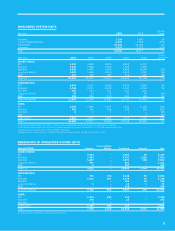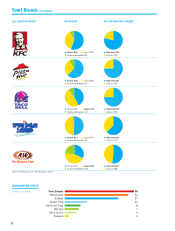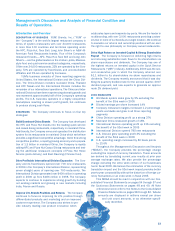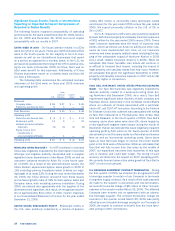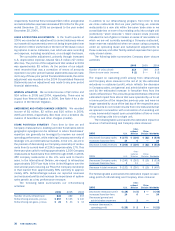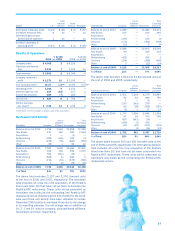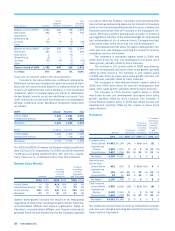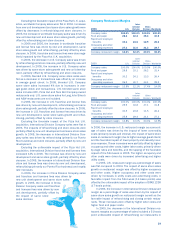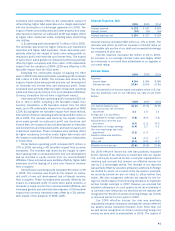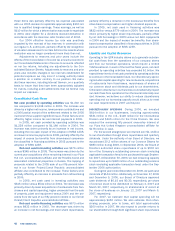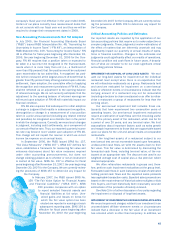Pizza Hut 2006 Annual Report Download - page 30
Download and view the complete annual report
Please find page 30 of the 2006 Pizza Hut annual report below. You can navigate through the pages in the report by either clicking on the pages listed below, or by using the keyword search tool below to find specific information within the annual report.
35
PIZZA HUT UNITED KINGDOM ACQUISITION On Septem-
ber 12, 2006, we completed the acquisition of the remaining
fifty percent ownership interest of our Pizza Hut United King-
dom (“U.K.”) unconsolidated affiliate from our partner, paying
approximately $178 million in cash, including transaction
costs and net of $9 million of cash assumed. Additionally,
we assumed the full liability, as opposed to our fifty percent
share, associated with the Pizza Hut U.K.’s capital leases of
$95 million and short-term borrowings of $23 million. This
unconsolidated affiliate operated more than 500 restaurants
in the U.K.
Prior to the acquisition, we accounted for our fifty percent
ownership interest using the equity method of accounting.
Thus, we reported our fifty percent share of the net income of
the unconsolidated affiliate (after interest expense and income
taxes) as Other (income) expense in the Consolidated State-
ments of Income. We also recorded franchise fee income from
the stores owned by the unconsolidated affiliate. From the
date of the acquisition through December 4, 2006 (the end of
the fiscal year for Pizza Hut U.K.), we reported Company sales
and the associated restaurant costs, general and administra-
tive expense, interest expense and income taxes associated
with the restaurants previously owned by the unconsolidated
affiliate in the appropriate line items of our Consolidated
Statement of Income. We no longer recorded franchise fee
income for the restaurants previously owned by the unconsoli-
dated affiliate nor did we report other income under the equity
method of accounting. As a result of this acquisition, com-
pany sales and restaurant profit increased $164 million and
$16 million, respectively, franchise fees decreased $7 million
and general and administrative expenses increased $8 million
compared to the year ended December 31, 2005. The impacts
on operating profit and net income were not significant.
ADOPTION OF STATEMENT OF FINANCIAL ACCOUNTING STAN-
DARDS NO. 123R, “SHARE-BASED PAYMENT” In the fourth
quarter 2005, the Company adopted Statement of Financial
Accounting Standards (“SFAS”) No. 123R “Share-Based Pay-
ment” (“SFAS 123R”). SFAS 123R requires all new, modified
and unvested share-based payments to employees, includ-
ing grants of employee stock options and stock appreciation
rights, be recognized in the financial statements as compen-
sation cost over the service period based on their fair value
on the date of grant. Compensation cost is recognized over
the service period on a straight-line basis for the fair value of
awards that actually vest. We adopted SFAS 123R using the
modified retrospective application transition method effec-
tive September 4, 2005, the beginning of our 2005 fourth
quarter. As permitted by SFAS 123R, we applied the modified
retrospective application transition method to the beginning
of the fiscal year of adoption (our fiscal year 2005). As such,
the results for the first three quarters of 2005 were required
to be adjusted to recognize the compensation cost previously
reported in the pro forma footnote disclosures under the pro-
visions of SFAS 123. However, years prior to 2005 have not
been restated.
As shown below, the adoption of SFAS 123R resulted
in a decrease in net income of $38 million and a reduction
of basic and diluted earnings per share of $0.13 for 2005.
Additionally, cash flows from operating activities decreased
$87 million in 2005 and cash flows from financing activities
increased $87 million in 2005. The impact of applying SFAS
123R on the results of operations and cash flows for 2006
was similar to the impact on 2005.
Inter- Unallo-
2005 U.S. national China cated Total
Payroll and
employee benefits $ 8 $ 2 $ — $ — $ 10
General and
administrative 14 11 4 19 48
Operating profit $ 22 $ 13 $ 4 $ 19 58
Income tax benefit (20)
Net income impact $ 38
Basic earnings per share $ 0.13
Diluted earnings per share $ 0.13
Prior to 2005, all stock options granted were accounted for
under the recognition and measurement principles of APB 25,
“Accounting for Stock Issued to Employees,” and its related
Interpretations. Accordingly, no stock-based employee compen-
sation expense was reflected in the Consolidated Statements
of Income for stock options, as all stock options granted had
an exercise price equal to the market value of the underlying
common stock on the date of grant. Had the Company applied
the fair value provisions of SFAS 123 to stock options in
2004, net income of $740 million would have been reduced
by $37 million to $703 million. Additionally, both basic and
diluted earnings per common share would have decreased
$0.12 per share for 2004.
SALE OF AN INVESTMENT IN UNCONSOLIDATED AFFILIATE
During the second quarter of 2005, we sold our fifty percent
interest in the entity that operated almost all KFCs and Pizza
Huts in Poland and the Czech Republic to our then partner in
the entity, principally for cash. Concurrent with the sale, our
former partner completed an initial public offering (“IPO”) of
the majority of the stock it then owned in the entity. Prior to
the sale, we accounted for our investment in this entity using
the equity method. Subsequent to the IPO, the new publicly
held entity, in which YUM has no ownership interest, is a
franchisee as was the entity in which we previously held a
fifty percent interest.
In 2005, this transaction generated a gain of approxi-
mately $11 million for YUM as cash proceeds (net of
expenses) of approximately $25 million from the sale of our
interest in the entity exceeded our recorded investment in this
unconsolidated affiliate. As with our equity income from invest-
ments in unconsolidated affiliates, the gain of approximately
$11 million was recorded in Other income (expense) in our
Consolidated Statement of Income.
The sale did not have a significant impact on our subse-
quently reported results of operations in 2005 or 2006.
SALE OF PUERTO RICO BUSINESS Our Puerto Rico business
was held for sale beginning the fourth quarter of 2002 and
was sold on October 4, 2004 for an amount approximating its
then carrying value. As a result of this sale, company sales
and restaurant profit decreased $159 million and $29 million,








